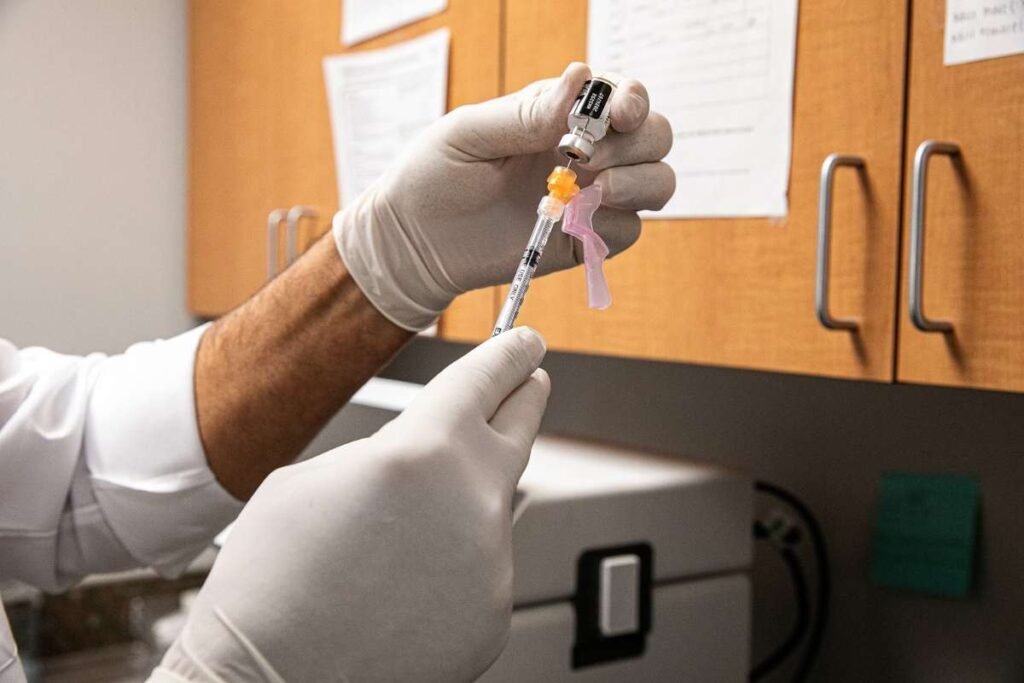Atlanta, Oct. 6, 2025—The Centers for Disease Control and Prevention (CDC) on Monday endorsed new vaccine recommendations from its Advisory Committee on Immunization Practices (ACIP), scaling back guidance on Covid-19 shots and restricting the use of a combined measles and chickenpox MMRV vaccine for young children.
The decision, signed by Acting CDC Director Jim O’Neill, aligns the agency with the Trump administration’s ongoing effort to review and modify existing public health policies. It follows the committee’s Sept. 19 vote in Chamblee, Georgia, to revise national vaccine recommendations.
Covid-19 guidance revised
The ACIP voted to remove the blanket recommendation that all adults 65 and older receive Covid-19 vaccinations. Instead, the committee now advises “shared clinical decisionmaking,” encouraging individuals to consult their healthcare providers to assess personal risks and benefits.
For people ages six months to 64 years, vaccination remains available under the same shared-decision model, with stronger encouragement for those with underlying medical conditions.
O’Neill said the updated approach restores patient choice in vaccination decisions. “Informed consent is back,” he said. “CDC’s 2022 blanket recommendation for perpetual Covid-19 boosters deterred health care providers from talking about the risks and benefits for the individual patient. That changes today.”
Critics of the shift have expressed concern that states and insurers may interpret the softened guidance as a reason to reduce vaccine availability or coverage. Public health experts warned that this could widen disparities in vaccination rates across regions.
Changes to childhood MMRV Vaccine
The CDC also adopted ACIP’s recommendation to discontinue the combined measles, mumps, rubella, and varicella (MMRV Vaccine) for toddlers between 12 and 15 months. Instead, children in this age group will receive separate shots for measles, mumps, rubella (MMR) and chickenpox.
The change is based on data showing a slightly increased risk of febrile seizures after the MMRV vaccine in younger children. The combined shot will remain an option for older children receiving later doses.
O’Neill encouraged vaccine manufacturers to produce separate, single-dose versions of current combination vaccines. He cited President Donald Trump’s earlier remarks recommending the MMRV vaccine be divided into “three totally separate shots.”
Some public health officials have raised concerns that requiring additional injections could lower vaccination rates, as more doctor visits and shots may discourage parents.
Insurance and program coverage
Under federal law, private insurers and public programs must continue covering vaccines recommended through shared clinical decisionmaking without cost to patients. The CDC’s formal endorsement also allows the agency to distribute vaccines under the Vaccines for Children (VFC) program, which provides free doses to Medicaid-eligible and uninsured children.
Public health officials had warned that the delay in CDC approval could prevent vaccine shipments under VFC, potentially disadvantaging low-income families. Monday’s action clears that barrier.
The CDC did not issue updates on the hepatitis B vaccine, though ACIP had been expected to revisit its infant vaccination schedule. The current policy recommends all newborns receive the first hepatitis B dose shortly after birth.
Health Secretary Robert F. Kennedy Jr., who leads the department overseeing the CDC, has maintained support for ACIP’s revised approach, signaling continued trust in the restructured advisory committee.
The agency’s latest decisions mark a significant shift in U.S. vaccine policy, emphasizing individualized medical consultation over universal recommendations — a move that is expected to shape public health practices in the coming months.









